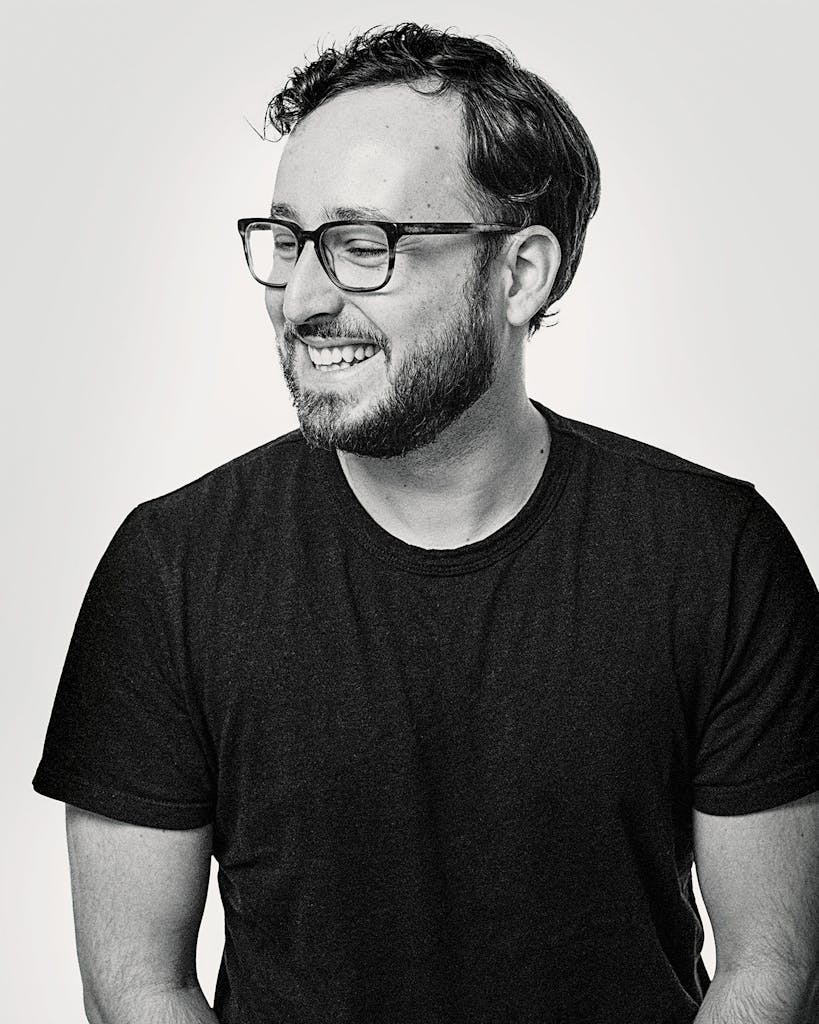Editors’ note: A previous version of this article described Rod Dreher as Catholic. In fact, he converted to Eastern Orthodox. Additionally, Arbery’s play Plano went on a five-week run in late spring 2019 at the Connelly Theater, not Playwrights Horizons’ main stage. The article has been updated.
Will Arbery, an award-winning playwright who has been compared to Anton Chekhov by his peers in New York’s theater scene, seems a little uncomfortable in front of an audience. Arbery is seated halfway up the grand marble staircase of the French Room Salon, in Dallas’s Adolphus Hotel, gently tapping his boots and pressing his palms into his slacks, making final adjustments and straightening papers as an expectant crowd looks on. On this evening in late October 2021, he’s about to read an excerpt from his new work, Corsicana, which debuts June 2 at New York’s Playwrights Horizons theater. Despite COVID wariness among the throng that’s gathered, it’s standing room only.
Some are interested in hearing Arbery speak about his breakout 2019 play Heroes of the Fourth Turning, a cerebral drama centered on a group of conservative Catholic college graduates grappling with the moral and political implications of the Trump presidency. It was a Pulitzer finalist and nabbed the 2020 Whiting Award for Drama and the New York Drama Critics’ Circle Award for Best Play.
It also made Arbery an unlikely emissary between culture war factions. Right-wingers felt seen and understood, especially Christian intellectuals who were Trump apologists, such as the influential writer Rod Dreher, who wrote, “Decades from now, if social historians wonder what it was like to be an American conservative in this tumultuous era, they will consult Will Arbery’s breathtaking new play for profound insight.” Liberals felt that the play artfully teased out the painful sources of reactionary political beliefs. Arbery was also finding success beyond the stage. He would spend the first few months of 2022 in London, writing for HBO’s Succession, his second season with the mordant, Emmy-winning series. And he’s developing his own TV show, Parallel, TX—a “sci-fi slow burn,” Arbery told me, about a young woman in Dallas.
Arbery, who grew up in Dallas’s Oak Cliff neighborhood, was also in town for a family reunion celebrating his father’s seventieth birthday. It was the first time his nuclear family of ten had been together in fourteen years. They had much to discuss. Arbery’s plays are profoundly personal; many of his characters are directly modeled after his seven sisters. Arbery’s first major work, 2018’s Plano, is a dark comedy about three Catholic sisters—hence the Chekhov comparisons—who are tormented by the selfish, noxious personalities of the men in their lives. Arbery again drew on his sisters’ experiences to craft the characters of Heroes, and the play’s fictional Transfiguration College of Wyoming is inspired by Wyoming Catholic College, where Arbery’s parents teach. (His father is also the school’s president.)
Corsicana follows Christopher, a 33-year-old professor who inherits the role of caregiver for his older sister, Ginny, who has Down syndrome, after their mother dies. Arbery’s older sister Julia inspired the character Ginny, and Christopher is clearly a stand-in for the 32-year-old Arbery. As Arbery begins reciting to the Adolphus audience, he settles into a rhythm that reflects much of his personality: doubting, unsure, quiet yet droll. It’s an emotional read, punctuated by laughs from the audience below. He gets to a monologue spoken by Christopher, who is recalling a trippy, mushroom-induced episode.
I started having this incredible experience, where I was half myself and half my dad. Like, I literally felt like half of my body was his. But, like, when he was my age. So half of me was this football-playing Christian in the seventies, and half of me was an out-of-shape failed filmmaker today. And it was the wildest thing—I got really adventurous. I had to, like, run everywhere and touch everything. And I felt really, like, . . . masculine. And really invested in performing a certain type of masculinity. But then the me side of myself was really ashamed that I was doing that . . .
And it was this insane act of understanding him.
Understanding what it was like to be inside his body. And to care about the things that he cared about. And to not be able to transfer that way of being into his son. It must have driven him crazy. And that just is what it is. And I forgive him. And that feels complicated and good.
For Arbery, exploring these deeply personal elements is an act of understanding himself and his family. “Writing about people you love is multifaceted, and it’s not easy,” he told me. “I think you just have to do it. I’d be lying if I said it wasn’t really hard and that sometimes it leads to me feeling tremendously guilty, feeling self-loathing, feeling like I’ve exploited the pain of the people I love. And I think all you can do is just try to have an honest conversation with them. And I think—at least my experience has been that it’s brought me closer to them.”
He paused. “But it’s tricky.”
Arbery has said he grew up with poetry and politics at the dinner table. His parents, Glenn and Virginia, earned doctorates—in literature and political philosophy, respectively—from the University of Dallas, a private Catholic college in Irving (several of Arbery’s sisters are also alumnae). They both taught there and participated in the Dallas Institute of Humanities and Culture.
Arbery attended the prestigious Cistercian Preparatory School, an all-boys Catholic secondary school in Irving, which shares a campus with a Cistercian abbey. He looks back fondly on his time there learning from the monks and teachers, and he was invited back to give the commencement address for last year’s graduating class. But there were times when he felt different from his classmates, quieter and more sensitive. He recalls hunting on a ranch that belonged to the family of one of his schoolmates, an experience that had a lasting impact on him: “I didn’t have a gun, but I watched as they shot this beautiful white boar and then just left it there for their groundskeeper to collect later.”
For him, that scene encapsulated the masculinity, privilege, and idea of whiteness that he grew up with. “I look back on that time, and I’m just sort of amazed at the extent of racism, homophobia, and misogyny that was just, like, part of the air that we breathed,” Arbery said. “And I knew early on that I hated that, though I was certainly complicit. I was in this female-dominated household but then spending maybe even more of my time in this male-dominated environment in Bush-era Texas. [It] was hugely formative to me and something I’m still working through.”

He’s quick to remember his teachers as a saving grace. “[English teacher] Jackie Greenfield is a huge reason that I think I’m a writer, because she recognized my talent early on—like, as early as age ten—and was very, very encouraging.” He left Texas to study English at Kenyon College and later earned an MFA at Northwestern University.
Maria Striar, artistic director of New York’s Clubbed Thumb, a theater company that stages plays from new and emerging playwrights, was among the first theater directors Arbery met when he moved to the city in 2015; she added him to her writing group. He started penning Plano in 2017 and submitted it for the company’s Winterworks Festival. After an early reading, it was greenlit for eleven performances in the 2018 summer stage series, followed by a five-week run in late spring 2019 at the Connelly theater in Manhattan’s East Village.
Striar said Arbery’s unique script and lack of transitions—the dialogue is rapid-fire, and there are no scene changes—appealed to her. “Will is an exciting writer creating great, vibrant roles for women, which is not something a lot of men do. I mean, he grew up with all those sisters,” Striar said. The actors helped shape the characters, and Striar weighed in as needed. “Will was so present,” said Crystal Finn, who played one of the sisters. “It felt like he was watching a dance; it did not feel scary. The heart of the play was [eventually] exposed.” She credited his upbringing and time spent with his sisters with giving him the ability to write from an emotional place. “Will bears witness to something and knows how to write it and how to be a part of it. It is a mystery how he could be so inside of it.”
Perhaps the most significant change Striar brought about was convincing Arbery to alter the names of the characters, who were each originally named for the sister they were inspired by. Arbery felt he needed to be truthful and transparent, but he was also concerned for his sisters’ feelings about being in the play in the first place.
“I just didn’t know which choice would be more ethical,” Arbery told me. “I still don’t. It was a crash course in what’s morally complicated about being a writer who writes about real people. It was when I learned the [Czeslaw] Milosz quote ‘A family is cursed when a writer is born into it.’ ” Striar convinced him that adding some distance would let the play stand on its own terms; Arbery remembered her showing him a book of saints for character-name inspiration.
Changing the names was a chiffon-thin veneer, especially for one of Arbery’s older sisters, Dallas-based artist Lucia Arbery Simek, on whom the character Genevieve is based. Genevieve is haunted by her faithless, abusive husband, Steve. The seeds for Plano were sown in the summer of 2014, when Simek, her three kids in tow, fled Texas for her parents’ place in Wyoming after her marriage ended. Arbery joined them for several weeks. He took the kids hiking, went to breakfast with the family, and kept his sister company as she grieved, helping her and her kids begin to heal from their trauma.
Simek knew her brother was working on a script about her marriage after the summer they’d spent together, and she knew she was “in” the play, but she said she didn’t know the extent to which she and her other sisters were depicted. She first saw Plano during its summer 2018 run, and then the mainstage version the following year.
Watching Plano was surreal for Simek. She saw her most vulnerable moments played back to her, with her voice and mannerisms rendered uncannily by actor Miriam Silverman. The set, designed by Daniel Zimmerman, resembled her home in Oak Cliff, which she’d lost in the divorce. It had minute, personal details that only Simek would recognize, such as a replica of her kids’ scribbles on the set’s wooden porch posts, meant to echo the crayon scrawls they’d made on their bedposts.
At first, Simek was a little put off, in part by the portrayal of her ex (“Steve seemed too much an imp” compared to the man she knew, she told Arbery after the early reading) and in part because her and her sisters’ personal stories were being told by their only male sibling. But she eventually came around to the play and is now one of Arbery’s biggest champions; it was Simek who organized the October reading of Corsicana at the Adolphus. “The plays are a love letter to his sisters, a kind of gift that has other odd things that come with it. They’re painful, but they carry a kind of beauty,” she told me.
Her brother would agree. “I think it’s important, as you’re writing, to be honest with yourself about whether you’re revealing this out of love or for other selfish reasons,” he said. “I think that love is often uncomfortable. But honesty, and even often anger, is a big part of love.”
With Plano, Arbery staked his artistic ground. The collaboration with Clubbed Thumb opened the door to Playwrights Horizons. And he would continue plumbing his life and those of his relatives to tell stories that explore religion, race, masculinity, politics, and despair. Danya Taymor, who directed Heroes of the Fourth Turning, is one of those who compares Arbery to Chekhov and lauds his ability to make a world that’s foreign to many theatergoers—that of conservative Catholics—relatable. “All of his plays are so specific and complete, so full of details. I know these people as types of people.”
Adam Greenfield (no relation to Arbery’s English teacher), the artistic director of Playwrights Horizons, produced Heroes. After its success, he was eager to work with Arbery again, so taking on Corsicana was a no-brainer. “Texas is the great American mystery,” Greenfield said, referring to the state’s cultural juxtapositions. “I am watching Cheer [the Netflix docuseries about a Corsicana cheerleading squad] and cannot believe this is the same town where Will’s characters exist.”
“Corsicana’s a funny little town,” Arbery said. “It has a sort of haunted feel to me. There’s some fun stuff that I wrote in there about, like, dinosaur ghosts. And there’s a legend there about this one-legged tightrope walker who fell to his death while [performing] in the center of town. No one knew his name, so he’s buried [under a marker that] just says ‘Rope Walker.’ ”
Arbery spent a few weeks in 2017 in the city, about an hour south of Dallas, at 100 West Corsicana, a restored 1898 Odd Fellows lodge that hosts residencies for visual artists and writers throughout the year. He fell into a deep depression, eating Domino’s every night and watching lots of YouTube. “It was very hot in Corsicana, and I was in a very dark period where I experienced intense loneliness,” he recalled. His time there led him to imagine an alternative reality in which he and his sister Julia were left alone to care for each other.
“The play was born out of being a brother to Julia and seeing the ways that she had to constantly renegotiate her desires and her expressions of them because the world doesn’t treat her the same as everyone else,” Arbery told Playbill.
Another generational talent, Sam Gold, who won a Tony Award for Best Musical Direction for Fun Home, is directing Corsicana. Before turning to Corsicana, Gold helmed Macbeth, starring Daniel Craig and Ruth Negga. Gold too remarked on Arbery’s sensitivity to the relationships between characters. “Will is expressing something profound about our vulnerability and interdependence as humans,” he said. “This play is so intimate you feel like you’ve been made part of their improvised family.”
Greenfield said Arbery “writes so deeply, with a sensitivity that is rare. I believe he is one of the greats.” Where Heroes prompted difficult conversations, Corsicana is what Greenfield called “aspirationally hopeful.” Corsicana depicts characters showing up for one another, building families wherever they form. “It’s about small groups. It’s about community. It’s about the right to well-being. It’s about family,” one of Arbery’s characters says. “It’s about an unforgiving land. It’s about unrealized utopias . . . I don’t know. It’s about Texas.” The lone son, the forever observer, carries the stories of his family, his life. Maybe one day that will change, Arbery joked.
“A large part of me writing these plays hasn’t been about showing my family members who they are; it’s been about showing them who I am through them. It’s the weirdest thing in the world. I’ll never get used to it,” he said. “I hope that I stop writing about my family because it’s so exhausting.”
Katy Lemieux is a writer from Fort Worth. Her work has been published in American Theatre, D Magazine, Esquire, and the New York Times.
This article originally appeared in the June 2022 issue of Texas Monthly with the headline “Sister Act.” Subscribe today.

